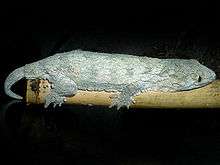Rhacodactylus leachianus
| Rhacodactylus leachianus | |
|---|---|
 | |
| Scientific classification | |
| Kingdom: | Animalia |
| Phylum: | Chordata |
| Subphylum: | Vertebrata |
| Class: | Reptilia |
| Order: | Squamata |
| Suborder: | Sauria |
| Infraorder: | Gekkota |
| Family: | Diplodactylidae |
| Genus: | Rhacodactylus |
| Species: | R. leachianus |
| Binomial name | |
| Rhacodactylus leachianus (Cuvier, 1829) | |
| Synonyms | |
| |
Rhacodactylus leachianus, commonly known as the New Caledonian giant gecko or Leach's giant gecko, is a large species of gecko, first described by Georges Cuvier in 1829, which is endemic to New Caledonia.
R. leachianus is found in all of the southern and eastern portions of the main island of New Caledonia, as well as on several of the smaller islands in the group.
Etymology
The specific name, leachianus, is honor of English zoologist William Elford Leach.[2]
Description
At 14 inches (360 mm) total length, it is the largest extant gecko in the world[3] and is considered an example of island gigantism. It has a heavy body, loose skin, and a small, stumpy tail. It is variable in color, coming in shades of mottled green, gray, and brown.[4]
Biology
R. leachianus is an arboreal species, living in trees. It is nocturnal, but may come out to bask in the sun during the day.[4] It eats a diet of insects, spiders, small vertebrates, fruit, nectar, and sap.[4]
Adult females lay two eggs at a time, having up to 10 clutches per year.[4]
The gecko can make a loud growling noise, and local people call it "the devil in the trees."[4]
Conservation status
Populations of this species have likely been reduced by habitat destruction and degradation. This process is still a threat to the species. It also faces predation by introduced species such as cats and various rodents. It is also poached. It can be electrocuted when it travels along power lines. This species is protected and it lives in several nature reserves.[5]
In captivity
This species is propagated with captive breeding. Wild populations are protected. This species can live up to 20 years in captivity. It can be kept in a large aquarium. Breeding pairs can be housed together, but otherwise the animal can be aggressive to tankmates. As an arboreal species, it should be provided with simulated tree holes in a tank with plenty of vertical space. A commercial gecko diet can be used. Live insects can be given as a supplement.[6]
Taxonomy
Historically, there have been three recognized subspecies of R. leachianus (including the nominotypical subspecies): R. l. aubrianus, R. l. henkeli (first described by Seipp and Obst in 1994), and R. l. leachianus. However, based on recent molecular data, no populations of R. leachianus are granted subspecies status at the present time.[5][7]
See also
References
| Wikimedia Commons has media related to Rhacodactylus leachianus. |
- ↑ Rhacodactylus leachianus. The Reptile Database.
- ↑ Beolens B, Watkins M, Grayson M. 2011. The Eponym Dictionary of Reptiles. Baltimore: Johns Hopkins University Press. xiii + 296 pp. ISBN 978-1-4214-0135-5. (Rhacodactyus leachianus, p. 153).
- ↑ Ballance, Allison; Morris, Rod. 2003. Island Magic; Wildlife of the South Seas. David Bateman Publishing.
- 1 2 3 4 5 Rhacodactylus leachianus. Australian Reptile Park.
- 1 2 Whitaker, A. H. & Sadlier, R. A. 2013. Rhacodactylus leachianus. The IUCN Red List of Threatened Species. Downloaded on 19 February 2016.
- ↑ New Caledonian Giant Gecko Care Sheet. Reptile Magazine.
- ↑ Bauer AM, Jackman TR, Sadlier RA, Whitaker AH. 2012. "Revision of the giant geckos of New Caledonia (Reptilia: Diplodactylidae: Rhacodactylus)". Zootaxa 3404: 1-52.
